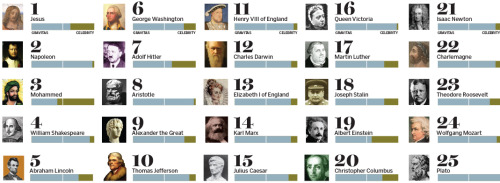Who's Bigger?: Where Historical Figures Really Rank
In identifying the most significant figures in human history the authors measure the impact of opinions. Thus the book, is a quantitative (aka metric) 'study' of opinions. Period. The ranking is based on a sample of the World's selected online resources, based on their format (i.e., web-based). It is not a rank by size of literature produced by a scholarly body or by historical period of occurrence or any other benchmarks of quantitative studies.
Summarily, this book is ranking of figures in human history by way of measuring the impact on opinions. WHEREAS, anyone who values facts, will not go near heresy/opinions/impressions/likes/dislikes, etc. Moreover a select sample of the Web, that includes the Wiki and similar community sources (attributed by academics as by and large anonymous, unreliable, and volatile nature), cannot be a means of a study to rank the sages of the ages. People who are looking at this pseudo-ranking approach, are getting excited that someone gets Top Rank. Is s/he really at the same NUMBER (based on the rule: What You See Is What You Get/vice versa, aka WYSIWYG/WYGIWYS) among the great historical figures??? Think twice, go check FACTS, and don't make historical judgments, based on opinions of Facebookers, Tweeters, clickers, likers, so on and so forth.
Hence, in deciding the place of historical figures, one must be careful. An Amazon's reviewer says: "Please don't buy this book. ...." [source: elmo]. In short, opinions don't count, it is facts that are supposed to be used for ranking, and I would still recommend, The 100: A Ranking Of The Most Influential Persons In History
Book Description:
Is Hitler bigger than Napoleon? Washington bigger than Lincoln? Picasso bigger than Einstein? Quantitative analysts are rapidly finding homes in social and cultural domains, from finance to politics. What about history? In this fascinating book, Steve Skiena and Charles Ward bring quantitative analysis to bear on ranking and comparing historical reputations. They evaluate each person by aggregating the traces of millions of opinions, just as Google ranks webpages. The book includes a technical discussion for readers interested in the details of the methods, but no mathematical or computational background is necessary to understand the rankings or conclusions...
The 100 Most Significant Figures in History (first 25 ranked)
(image courtesy: miketrap.com/bostonglobe.com)
On the same shelf:
 Available @ Amazon.com
Available @ Amazon.com




 More about (my new home) Google sites and the old home, READ
More about (my new home) Google sites and the old home, READ
No comments:
Post a Comment